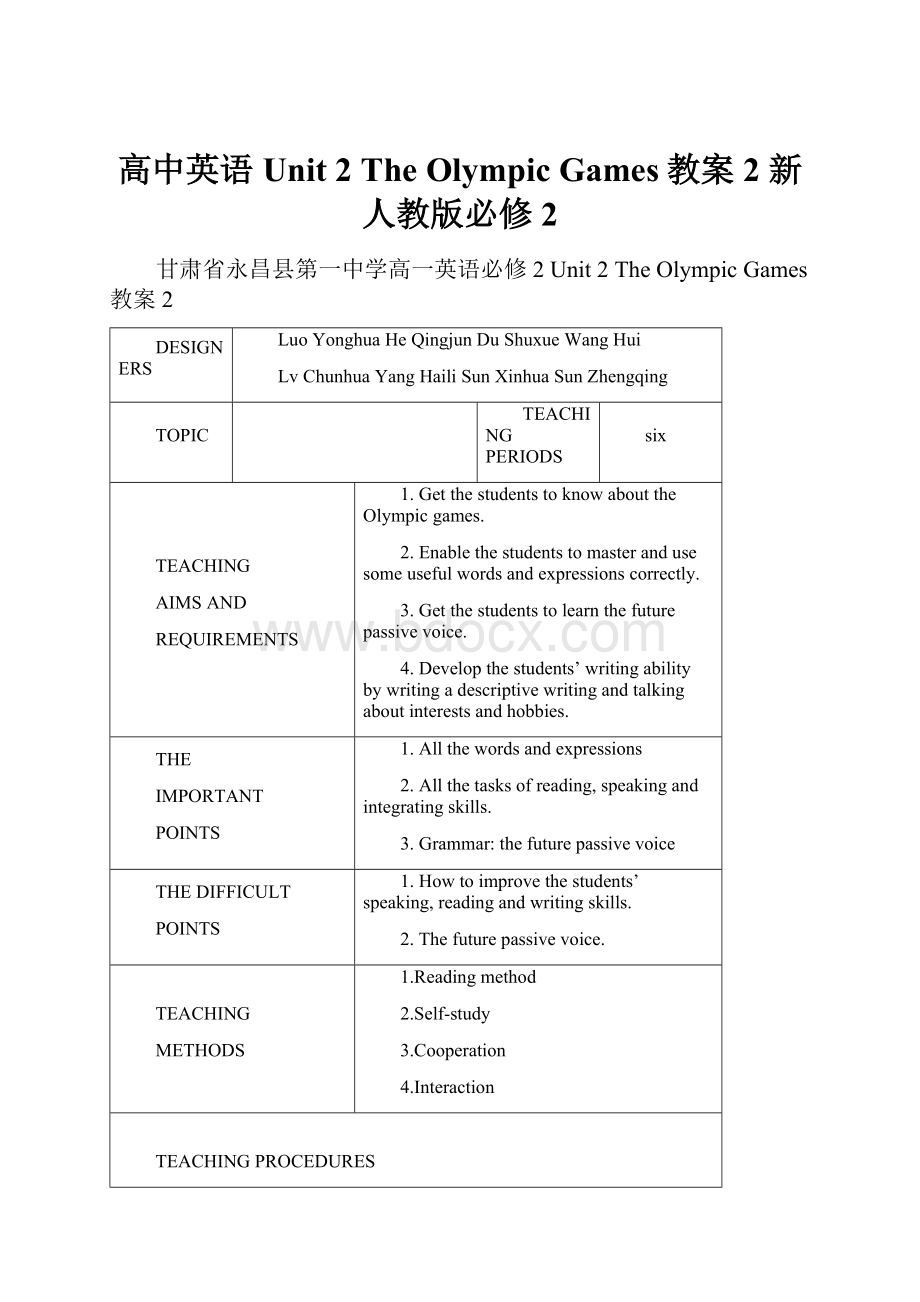高中英语 Unit 2 The Olympic Games教案2 新人教版必修2.docx
《高中英语 Unit 2 The Olympic Games教案2 新人教版必修2.docx》由会员分享,可在线阅读,更多相关《高中英语 Unit 2 The Olympic Games教案2 新人教版必修2.docx(27页珍藏版)》请在冰豆网上搜索。

高中英语Unit2TheOlympicGames教案2新人教版必修2
甘肃省永昌县第一中学高一英语必修2Unit2TheOlympicGames教案2
DESIGNERS
LuoYonghuaHeQingjunDuShuxueWangHui
LvChunhuaYangHailiSunXinhuaSunZhengqing
TOPIC
TEACHINGPERIODS
six
TEACHING
AIMSAND
REQUIREMENTS
1.GetthestudentstoknowabouttheOlympicgames.
2.Enablethestudentstomasterandusesomeusefulwordsandexpressionscorrectly.
3.Getthestudentstolearnthefuturepassivevoice.
4.Developthestudents’writingabilitybywritingadescriptivewritingandtalkingaboutinterestsandhobbies.
THE
IMPORTANT
POINTS
1.Allthewordsandexpressions
2.Allthetasksofreading,speakingandintegratingskills.
3.Grammar:
thefuturepassivevoice
THEDIFFICULT
POINTS
1.Howtoimprovethestudents’speaking,readingandwritingskills.
2.Thefuturepassivevoice.
TEACHING
METHODS
1.Readingmethod
2.Self-study
3.Cooperation
4.Interaction
TEACHINGPROCEDURES
THEFIRSTPERIOD
TOPIC
DESIGNERS
LuoYonghuaLvChunhua
TEACHINGPROCEDURES
StepI
自学检测(学生活动)
二次备课
Learnandreadthewordsofunit2.
StepII
导入新课,明确目标(教师活动)
目
标
1.GetthestudentstoknowsomeknowledgeabouttheOlympicgames.
2.TogetSstotalkaboutinterestsandhobbies.
Leadin
1.Showthepicturesaboutthe2008Olympicmascots(吉祥物).2.AskSswhethertheyknowsomeothermascots(吉祥物).
Step
师导生学,互动探究(师生互动)
1.Warmingup
Pairwork:
GetSstotalkaboutthequestionsbelow,andthenaskthemtopresentitbeforetheclass.
1.WhenandwheredidtheancientOlympicGamesstart?
A.776BC;OlympiaB.393BC;RomeC.1896;Greece
2.WhenandwheredidthemodernOlympicGamesstart?
A.1888AD;PairsB.776BC;OlympiaC.1896;Athens
3.WhendidChinafirsttakepartintheOlympics?
A.1932B.1928C.1936
4.WhowasChina’sfirstgoldmedalwinnerandforwhatevent?
A.ZhouJihong;divingB.Lining;gymnastics
C.XuHaifeng;shooting
5.DoyouknowthethreewordsthatshowthespiritoftheOlympicGames?
A.taller,faster,strongerB.higher,swifter,stronger
C.stronger,quicker,longer
SuggestedAnswers:
1.A2.C3.A4.C5.B
2.Speaking:
(Groupwork)
Carryoutasurveyoftheinterestsintheclassandwritedownthenamesoftheclassmateswhohavethesameinterests.Youcancarryoutthetasklikethis.
1.Whichsportsdoyouknow?
2.Whichofthesportsdoyoulikebest?
3.Whatisyourfavoritesportsstar?
4.Areyouinterestedin…?
Afterthesurvey,theSswhohavethesameinterestssittogetherandpleaseworkingroupsoffourtotalkabouttheirinterest.Atlast,letSspresenttheirdialogues.
StepⅣ
小组测评(生生互动)
Actingout
GivetheSsseveralminutestoprepareforthedialogueandthencallsomeofthemtoacttheirdialoguesout.
StepV
小结与布置作业
Finishthetopic:
Myfavouritesport
StepVI
课前自学
1.Learnthenewwordsofthisunit.
2.Preparethereadingpassage.
RecordAfterTeaching
THE SECONDPERIOD
TOPIC
Reading:
Aninterview
DESIGNERS
HeQingjunWangHui
TEACHINGPROCEDURES
StepI
自主学习,自学检测(学生活动)
二次备课
1.Checkthenewwordsofthisunit.
2.Checkthehomework.
Step
导入新课,明确目标(教师活动)
1.Tocatchthemainideaofthetext.
2.Tounderstandsomeusefulwordsandexpressions.
3.Toimprovethestudentsreadingability.
Pre-reading:
Answerthesequestions:
1.DoyouknowanydifferencesbetweentheancientandmodernOlympicGames?
Listtwoofthem.
2.WhenandwherewillthenextOlympicGamesbeheld?
3.Lookatthetitleandthepicturesandpredictthecontent.Then
readitquicklyandseeifyouwereright.
Step
师导生学,互动探究(师生互动)
Reading
1.AskSstofindthewritingtypeandthemainideaofthetext.
Thewritingtype:
conversationalstyle(aninterview).
Mainidea:
comparingthedifferencesbetweenAncientandModernOlympics.
2.Scanning
(1)Whatarethesimilarities?
Howoften
Bothareheldeveryfouryears.
Whatfor
Bothareheldnotformoneybutforhonor.
Beliefs
Theyarethesame.Swifter,Higher,andStronger.
Competitors
MenareallowedtotakepartbothinancientandmodernOlympics.
Events
Someeventsarethesame,suchasrunning,jumping,shooting,andthrowing.
(2)Whatarethedifferences?
Ancient
Modern
Games
Summer
Summer&winter
Country
OnlyGreece
Countriesfromallovertheworld
Competitors
Onlymen
Menandwomen
Prize
Olivewreath
Medal
Events
Afew
Manymore
3.ReadthepassagecarefullyandsilentlyandfinishEx2(P11).
4.Discussion:
Youknowourgovernmenthastrieditsbesttocompeteforhostingthe29thOlympicGames.Ithascostalotofmoney.Doyouthinkitisworthwhile?
Why?
Foryourreference:
ItisworthwhiletohosttheOlympicGames.TohostOlympicGamescanmakeourcultureandpeopleunderstoodbytheotherpeoples.TohostOlympicGamescanmakeourcountryknowntothewholeworld.TohostOlympicGamescanstimulateoureconomy,andhelptospeedupitsdevelopment.
Step
小组测评(生生互动)
Consolidation
Askthestudentstoreadthepassageagainandtrytoretellit.
StepV
小结与布置作业
1.Learnthenewwordsandexpressionsinthispartbyheart.
2.Readthetextagainandagainandwriteasummaryofthetext.
StepVI
课前自学
EB:
1.Learntheuseofsomeimportantwordsandexpressions
2.Finishtherelatedexercisesinreadingperiod.
RecordAfterTeaching
THE THIRDPERIOD
TOPIC
Languagepoints
DESIGNERS
SunXinghuaYangHaili
TEACHINGPROCEDURES
SStepⅠ
自学检测(学生活动)
1.Checktheexercisesinexercisesbook.
2.Asksomestudentstoretellthepassageintheirownwords.
3.Askstudentstolearnthelanguagepointsinexercisebookbythemselves.
StepⅡ
导入新课,明确目标(教师活动)
1.Learnthewordsandexpressionsappearinginthereadingpassage.
2.Masterthesentencepatterns..
3.Understandsomedifficultandlongsentences.
Leadin
1.Getthestudentstoreadthereadingpassageagaintounderlineallthenewwordsandusefulexpressionsorcollocationsinthepassage.
2.Dotheexercisesindiscoveringusefulwordsandexpressions
StepⅢ
Ⅳ
师导生学,互动探究(师生互动)
LanguagePoints:
Importantwords
归纳总结
1.admitv.承认;准许进入
(1)admit+n./doing(havingdone)/that-clause承认某事/(已经)做了某事
(2)admitsb./sth.tobe/as承认某人/某物是……
(3)admitsb.to/into...准许某人进入(或加入)……
(4)Itisadmittedthat...人们公认……
即学即用
(1)他被接受成为棒球队的一名队员。
He________________amemberofthebaseballteam.
(2)他承认做错了事。
He__________________wrong.
(3)He____________theclubafterhistenthtry.
(被批准参加).
Choosethebestanswer.
1.Thethiefadmitted______hiswallet.
A.tostealB.stealing
C.tohavestolenD.havingstolen
2.Hisparentsadmittedhim______hisclassmate’sbirthdayparty.
A.totakepartinB.takingpartin
C.totakepartD.takingpart
2.every表时间或空间的间隔
1)every与基数词连用。
every+基数词+复数名词=every+序数词+单数名词,表“每……;每隔……”例如:
EveryfouryearsathletesfromallovertheworldtakepartintheOlympicGames.
Iusuallygotomyuncle’severythreedays(=everythirdday).There’sabusstopeverytwomiles.每两英里有个车站。
2)every+other+单数可数名词,表“每隔……”;every+few+复数名词,表“每隔几”。
例如:
Pleasewriteoneveryotherline(thirdline).
Thedoctorcomestoseemymothereveryotherday.
Sentencepatterns:
1.OurGreekcitiesusedtocompeteagainsteachotherjustforthehonorofwinning.
forthehonorof为了…的荣誉
inthehonorof为庆祝…/为纪念…
Itisanhonor(forsb.)todosth某人做某事感到很荣幸
2.Noothercountrycouldjoinin,norcouldslavesorwomen.
其他国家都不能参加,奴隶和妇女也不行。
1)nor用作连词,引起倒装句,意为“也不…”。
Heneverwentagain,nordidhewritetoapologize.
Idon’tknow,nordoIcare.
Ihaveneverbeendishonest,nordoImeantostartbeingsonow.
2)neither/nor+倒装结构(be/情态动词/助动词+主语),表示前面提到的否定情况也适用于另一个人或事物“也不”
Hecan’tdoit.Ican’tdoit,either.
=Hecan’tdoit,norcanI.
Iwillnotgothere,_________________(他也不会去)。
Youneverheardfromhim,________________(我也没有收到他的来信)
Nor/Neither+助动词+主语…也一样…(否定句)
So+助动词+主语…也一样…(肯定句)
so+主语+助动词…确实这样
主语+助动词+so这样做了
(1).Ididn’tgothere._____________she.(她也是。
)
(2).Shewasateacher.______I.(我也是这样。
)
(3).Igotupearlythismorning.__________(我确实起得早)
3.Womenarenotonlyallowed,but(also)playaveryimportantrolein…
1)allowsbsth允许某人某事
2)allowsbin(out)允许某人进入(出去)
3)allowsbtodosth允许某人做某事
(不能说allowtodo)
4)allowdoingsth允许做某事
5)beallowedtodosth被允许做某事
汉译英:
在候车室乘客不允许吸烟
Passengers__________________inthewaitingroom.我们不许在这里吸烟。
Wedon’t____________________
4.ForeachOlympics,aspecialvillageisbuiltforthemtolivein,amainreceptionbuilding,severalstadiumsforcompetitions,andagymnasiumaswell.
aswell用在肯定句中,放在句子末尾
too肯定句中用,放在句子末尾,常用逗号隔开
either否定句中用,放句子末尾,常用逗号隔开
also放在特殊动词之后,实义动词之前
Iamalsoastudent.=Iamastudents,too.
Lucydidn’tgototheparty,either.
TonyspeaksJapaneseaswell.
Shehasknowledgeandexperienceaswell
1)aswellas常用来连接两个并列的成分,作“也,还”解。
它强调的是前一项,后一项只是顺便提及。
因此连接并列主语时,谓语动词与前一项一致;而用notonly...butalso...连接时,谓语动词与后一项一致。
如:
Yourwifeaswellasyouisfriendlytome.
不仅你而且你的妻子也对我很友好。
(=Notonlyyourwifebutalsoyouarefriendlytome.)
2)aswellas用来表示同级比较,指“一样好”。
如Heplaystheguitaraswellasyou.他的吉他弹得和你一样好。
1).YaoMingisgoodatplayingbasketballandhedoeswellinlearningforeignlanguages____.
A.aswellB.aswellasC.alsoD.either
2)E-mail,aswellasthetelephones,________animportantpartindailycommunication.
A.isplayingB.haveplayed
C.areplayingD.play
5.It’sstillallaboutbeingabletorunfaster,jumphigherandthrowfurther.
farther距离或时间上更远的,是指具体的
further更远的(=farther);程度上进一步的,是指抽象的
e.g.Wecan’tgoanyfartherwithoutarest.
e.g.Wemustgetfurtherinformation.
e.g.Weneedtakefurthersteptodealwiththematter.
6.everyonewantsto动词不定式省略动词
1)当动词不定式在某些动词后作宾语时,